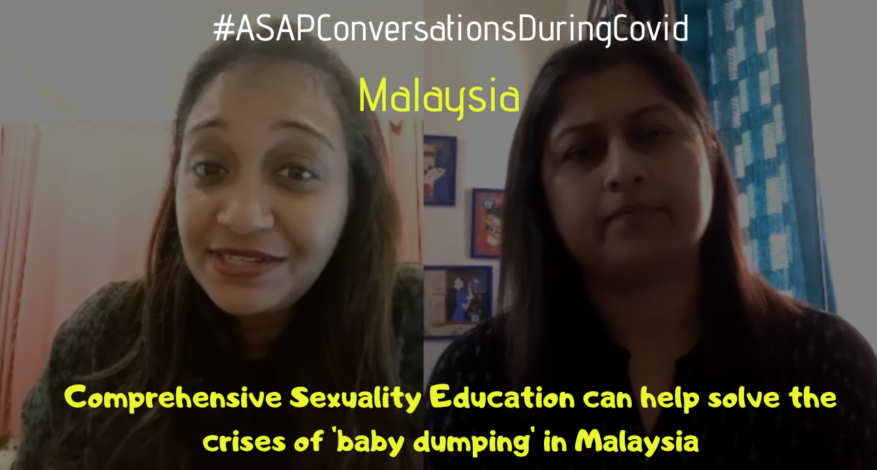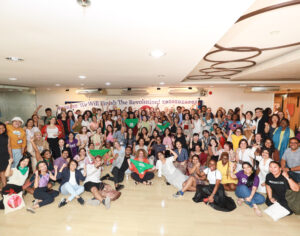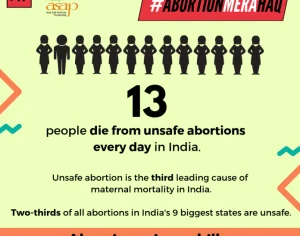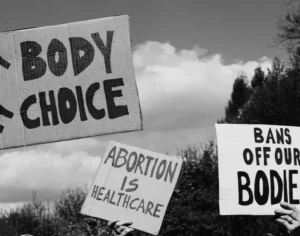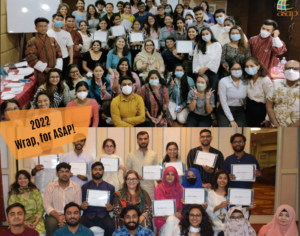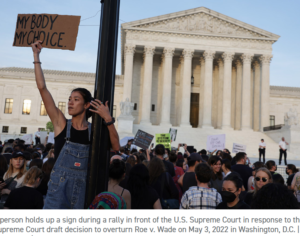Comprehensive Sexuality Education Can Help The Crises of ‘Baby Dumping’ in Malaysia – ASAP Conversation with Dr Subatra Jayaraj
This blog is part of a series of Covid conversations with members and partners to understand the impact of the pandemic on safe aborion access for their communities.
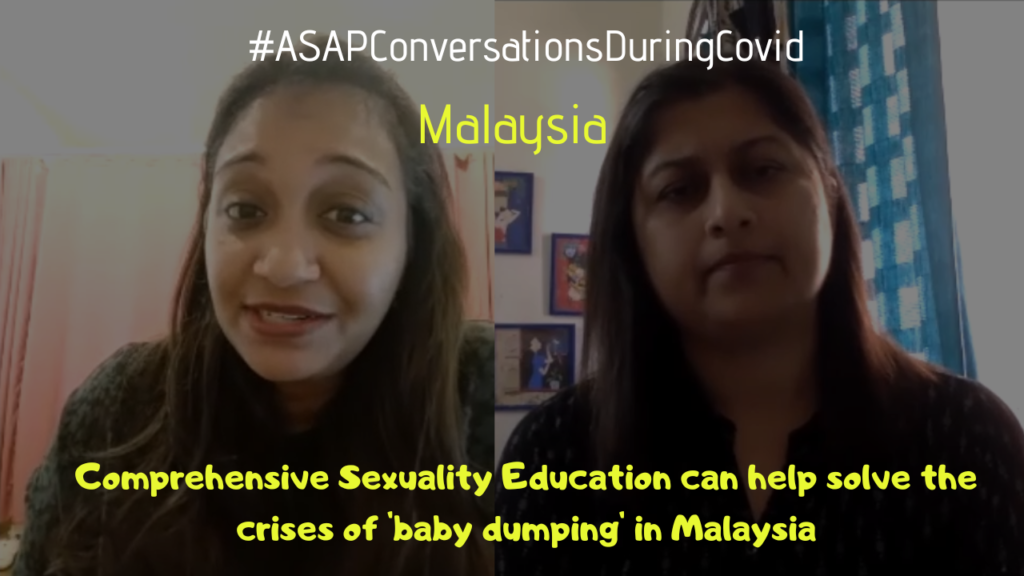
Our guest today is Dr. Subatra Jayraj from Malaysia in conversation with Suchitra Dalvie, Coordinator ASAP. Dr. Subatra is a physician who runs a women friendly clinic in Kuala Lumpur, Malaysia, providing a complete range of sexual health services, including termination of pregnancies. She is also Chair of the ASAP Steering Committee at present.
Suchitra- Could you give us some background about the abortion law in Malaysia. Like is it criminalised, legalised, are the facilities available for free in the public sector, private sector?
Subatra- In Malaysia the law is reasonably progressive compared to the rest of the world. Termination of pregnancies is allowed if a doctor decides, in good faith, that it is needed to save the mother’s life or for the mental or physical health of the patient. So, in a sense generally it is accessible and most procedures are actually done for the mental health of the patient.
Although we have termination of pregnancy guidelines by the Ministry of Health Malaysia, the majority of terminations are actually done in the private sector. The public sector hospitals only sort of restrict their procedures to saving the mother’s life and the majority of the clients have to go through the private sector. Generally, in Malaysia, as with the rest of the world ninety percent of terminations occur in the first trimester. We do get our fair share of second trimester requests and this has actually increased in covid 19 situations. We’ve had a few movement control phases since 17th of March 2020 when the covid outbreak started in Malaysia. So, this restriction of movement has changed a little bit of access,but generally the majority of procedures are still accessible.
Suchitra- Right, so just to talk about what happened pre-covid in terms of access to abortions you’re saying it was still accessible. So, is it easily accessible for women in the private sector in terms of costs or geographical access? Is there a lot of stigma around it? Are abortion clinics stand alone or are they part of women’s health facilities?
Subatra- Unfortunately even if the termination of pregnancy is legal and available in Malaysia, accessibility becomes questionable when it’s a very stigmatized procedure. Also there’s a lot of different understanding among the medical health professionals themselves. I am the honorary Secretary of the Reproductive Rights Advocacy Alliance (RRAAM) and also a part of the ASAP Steering Committee. And we’ve done a few surveys amongst O&G professionals and majority of them do not actually know that the procedure is legal in Malaysia.
So, what happens is that the clients are pushed from one city to another and it depends on if the doctors are actually willing to provide or are even trained to provide the procedure. Then it becomes the issue of cost as well because the issue and the procedure is very stigmatized. The range of cost for termination procedures is from about
700 ringgit which is about 200 US dollars to about 5,000 and 6,000 ringgits. Majority of private hospitals charge a lot and if you add anaesthesia for a very simple case, it will become a couple of thousand Ringgit. So, cost is also very prohibitive. Another prohibitive factor is where the clinics are situated. My clinic is situated near the capital and there are not many doctors who openly provide the service, that’s also a challenge.
Suchitra- I am glad you spoke about RRAAM because I did want to ask you about the scope of work of RRAAM. Also to say that we are really grateful to have had collaborations with RRAAM through all these years. In fact as you know Dr. S.P Choong was one of our founding members and he is very active in RRAAM as well, and you are now on our Steering Committee. Could you tell us a little more about RRAAM– why was it founded? What is the work that you’ve been doing? And are you addressing the issues that you just mentioned about the stigma with medical providers? The way you describe the service in the private sector it’s like an underground service. Although the law is liberal, there is a lot of stigma from both sides and everybody has to hide and find a lot of money, to be able to ‘pay for their sins’ in a sense and get these expensive services which should actually be available for free in the public sector.
Subatra-Absolutely, which is also why RRAAM was formed 10 years ago because despite the procedure being legal there are huge barriers to actual access. RRAAM was formed as an advocacy organization, formed by individuals, organisations and also healthcare providers. So, we also have legal organisations and women’s rights organisations to provide a lived reality perspective and all come together and advocate for reproductive rights in general–which includes access to termination of pregnancy and to contraception.
Unfortunately, yes, it is kind of a hidden procedure or hidden service and we also run a hotline to provide clients information on where to access the service. So that’s another thing nobody knows– which clinics to go to and then just jumping from one clinic to another also delays the procedure so RRAAM tries to find a clinic near them. RRAAM also provides options for medical abortion which is not accessible right now in Malaysia. So we give them complete range of options, which is surgical option, which is available via service providers in Malaysia or a medical abortion, which is currently not allowed in Malaysia because the government has restricted the medication and it is not registered. But we do recommend options such as Women on Web or accessible, reliable, safe services that they can access.
Suchitra- So what has been the government’s justification for not registering mifepristone, given that the law allows abortion procedures?
Subatra- As usual, there is a lot of ‘justification’. The latest reason they said was that we do not do that, as there are alternatives available. The ‘alternatives’ they talk about are 100 times more expensive .
Suchitra- The combination of mifepristone and misoprostol is so much more effective.
Subatra- Exactly, so evidence has shown that it is so much more cost effective, it’s so much more safe, so much more accessible if used in the correct dose with proper guidance. But you know there’s a lot of socio-political, religious aspects to reproductive rights. We actually had a document come out which really showed how cost-effective, how there was a benefit in, how safe it was and then unfortunately the conclusion of the document was totally the opposite to say that we do not need it at this point of time because we have an alternative. Honestly the alternative is really bad because it prevents access and as we know preventing access to termination of pregnancies only encourages unsafe abortion.
Suchitra- So, it’s a very challenging environment in which you’re working! I just wanted to ask you in terms of the whole spectrum because RRAAM also talks about reproductive rights and I know that unsafe abortion is not the only pathway women choose when they don’t access safe abortion. I know that baby dumping has been a very big issue in Malaysia for a while. So, there’s a whole spectrum of issues with sexuality education and correct me if I’m wrong but I think it’s not legal to provide contraception to unmarried young people?
You also have an issue of child marriages the way we do in India in many parts of Asia. So what role does RRAAM see in this whole gamut of issues with the stigma of sexuality and abortion which is very strongly seen and suffered by the women who are going through it?
Subatra- Definitely! Reproductive rights includes the right to access services and right to information and a huge part of it is actually addressing the right to information and stigma as well. So, baby dumping unfortunately is very highlighted in Malaysia– we get one new case of baby dumping every three days according to statistics for the last five years so that’s quite a lot. It is like a hundred babies found per year. There’s been many kinds of things that they’ve been doing such as baby hatches and all but it doesn’t really address the issue.
Why clients are actually resorting to baby dumping is because they have read or they have a whole huge stigma behind a pregnancy that is unwanted. They don’t know where to go early on and they don’t have access to information that termination is an option that is safe and available in Malaysia, so they find out really late. Also, sexuality education is available in Malaysia, but we have really bad comprehensive sexuality education. Many of my clients do not know if you’re sexually active and you miss a period it means you’re pregnant until proven otherwise.
So, this is like just a failure of the system– why don’t women who miss their periods know that there is a risk of pregnancy?It’s just basic information that every individual should know. Unfortunately, what happens is when they come late and it becomes later than the second trimester then there is very little we can do.
Also going into public hospitals is a huge stigma if you’reMuslim. We are a Muslim majority country and there’s different laws for Muslims. It’s not illegal to give contraception. Ordinary people can access medication as everybody else but it depends on where you go. So, if you go to a hospital it depends on the health provider whether they want to judge and they want to provide the service. So there’s no law as with any other medication but it’s unfortunate that people include their judgement to provide medical services.
Suchitra- So I think Malaysia, like any other country in our part of the world, is suffering from these multiple intersectional and structural inequities in terms of race, in terms of patriarchy, in terms of sexism, gender discrimination. So, what are the lessons that we are learning through the covid pandemic and the responses to it that can help us advocate for what we are liking to call now the new normal? Because I remember some time back there was an article from I think the Ministry of women and Family Welfare from Malaysia which gave some very bizarre advice for women on how to behave to keep their husbands happy during the lockdown and I think it just brought to mind the fact that there’s so much stereotyping and so much pressure on women as well as men to follow certain roles. Like men are supposed to be these helpless almost infantilized creatures even as adults and the women are supposed to kind of be wife and mother and everything at the same time.
So, how do you think being forced to stay at home are men helping out with domestic work more? Are doctors recognizing or even the health system recognizing the gaps that people have had for access and do you think things might improve afterwards?
Subatra- Yeah that is really unfortunate what the Minister of women and community development said. Women should stay at home and take care of their husbands–which is not really addressing the structural issues of domestic violence also and what happened especially in this movement control order and with restricted movement and forced people to stay at home. So, with forcing people to stay at home or at different points of time without any protection and without any options and information and access, the evidence is quite clear that domestic violence has increased.. People cannot access contraception so what we should do is to facilitate these kinds of access. What we’ve learned is that medical abortion is a very good alternative, if you cannot access a service provider personally to come face to face. In the early stages
Medical termination is very safe and we should actually facilitate it. Unfortunately, we are very much behind so this is one of the lessons we learned. But in Malaysia what we have realized is that it also depends on an international source, depends on the whole supply chain and Women on Web has actually said that their resources were depleted for a while coming to Malaysia since there was a gap in the supply chain for a while.
But , but why can’t we have medical abortion pills given online same as how many hospitals have started giving medications by a post ? .
Suchitra- I think yes we are all going through a phase of very difficult transitions. Some people are more vulnerable than the others because of their already existing inequalities like for example in you know in India we’ve been discussing with our partners who work with the queer community or sex workers collectives and as you said quite rightly young people who’ve got used to all the freedom they’ve had in the universities are suddenly kind of under household surveillance. So do you have any sort of last messages for us as a provider because I know you are in the middle of your clinic work–you’ve already seen some clients in the morning and you have to continue. So is there anything you are seeing from any messages of resilience or any positive messages that are emerging from these women who are finding their way to you during this pandemic?
Subatra- I think it’s very important for them to know that services are still available, but there is a lot of traffic on our hotline. So, I think there is a gap in them actually being able to travel but just knowing that services are available is a huge advantage. I recently saw clients who had to stop their contraceptive pills, couldn’t get them during these past two months and got pregnant. So also to put it out there that contraceptive medical services and pharmacies are still open and they should be able to access them. A lot of the budget from the Ministry has been dedicated to infectious disease, covid, maintaining hospitals etc so we know that the focus is not going to be reproductive health. The Ministry of Health has recognized that there is going to be a baby boom in nine months but they’ve not said how many of these pregnancies will be unintended. We know that a lot of people have been suddenly dropped from their jobs, they’ve not been paid. There’s a lot more socio-economic challenges so people will have differences in whether they will want to continue the pregnancy or not. I feel like we need to continue providing options to women so that they know these options are available.
Suchitra- Thank you so much for that positive message and thank you very much for the work you with RRAAM as well as in your personal capacity as a safe abortion provider. You are continuing to provide the service through the pandemic and we just wish you to stay safe and take care. And thank you very much for your continued association with ASAP thank you for joining us and we look forward to catching our post pandemic..
Subatra-We say service providers are the frontlines and need to keep going but also behind the scenes our project officer has and our hotline counsellors they have been working very well. Shoutout to all of them too!
Suchitra- Yes, we thank the entire clinical team and all the healthcare providers who are defending the frontlines and making sure people still have access to the services they need so thank you all very much and thank you for joining us today for this conversation!
